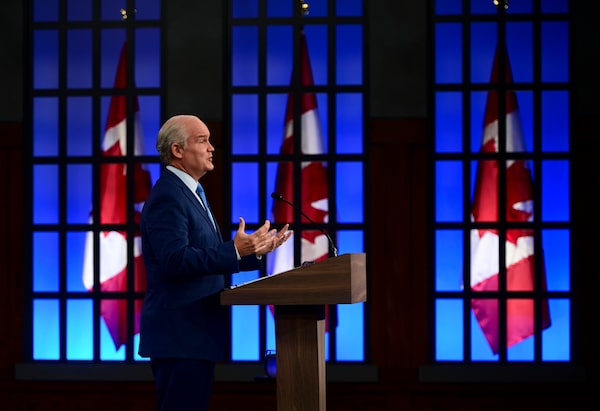
Conservative leader Erin O'Toole holds a press conference in Ottawa on Tuesday, June 29, 2021. THE CANADIAN PRESS/Sean KilpatrickSean Kilpatrick/The Canadian Press
With an election call expected in the coming days, the Conservative Party’s prospects appear dire.
The party is at risk of being swept in Atlantic Canada and of losing seats in Quebec and Ontario. Ridings in the Prairies and in British Columbia’s Lower Mainland are in play. The Liberals could even make gains in the B.C. Interior, traditionally a Tory stronghold.
Huge caveat: Campaigns matter. During the campaign, Conservative Leader Erin O’Toole could exceed expectations. The party is well financed, with a solid, if shrinking, core of loyal supporters, A strong performance by Mr. O’Toole in the leaders’ debates and a few breaks here and there could turn things around.
But unless they get those breaks, the Tories face a drubbing.
Part of the problem lies in Mr. O’Toole’s climate-change plan. That plan, which includes putting a price on carbon, has been praised by economists and environmentalists, but criticized by many on the right who oppose carbon taxes.
In the 2015 election, the Liberals took four seats in Alberta, one in Saskatchewan and seven in Manitoba. Four years later, they were shut out of Alberta and Saskatchewan, and reduced to four seats in Manitoba. If current conditions hold, the result in 2021 could look much closer to 2015 than 2019.
The situation for the Conservatives in B.C. is grim. The polling aggregator 338Canada.com has the Tories running third in that province. Not only are seats at risk in the Lower Mainland, a few ridings in the Interior, such as Kamloops–Thompson–Cariboo or North Okanagan-Shuswap, might be vulnerable.
Defections in Western Canada would be worth the cost, if the Conservatives picked up scads of seats in Central Canada in exchange. Federal elections are won and lost in the dense band of constituencies surrounding Toronto. Polls have consistently shown that middle-class suburban voters there take climate change seriously. They should be impressed by Mr. O’Toole’s plan.
But 338.com has the Tories almost 10 points behind the Liberals in that province. Unless that gap narrows, Conservative seats in Niagara and Southwestern Ontario could be at risk. Even Mr. O’Toole’s Durham seat and Carleton, held by high-profile MP Pierre Poilievre, are thought to be vulnerable. The Tories will also have to fight hard to hold on to even half of their 10 seats in Quebec. And they could lose all four seats in Nova Scotia and New Brunswick.
Why has Mr. O’Toole made so little headway? It could be his chameleon-like tendency to become whatever you want him to be. He had initially planned to run to the left of Mr. Poilievre in last year’s leadership race. But when Mr. Poilievre decided not to run, Mr. O’Toole successfully positioned himself to the right of former Progressive Conservative leader Peter MacKay instead.
Having won the leadership by attracting “true blue” Conservatives, Mr. O’Toole then pivoted, announcing his solidarity with the LGBTQ community, taking climate change seriously and seeking the votes of unionized workers, as Prime Minister Boris Johnson successfully did in Britain.
Social conservatives rebelled. Delegates at the party’s policy convention in March voted down a resolution affirming “climate change is real.” Backbench MPs filibustered Liberal legislation that would have banned the practice of conversion therapy on LGBTQ minors. Mr. O’Toole seemed unable to control either his party or his caucus.
Now, he appears to be on the brink of heading into an election that could secure Liberal Leader Justin Trudeau a second majority government, which would place Mr. O’Toole’s political future very much in doubt.
The good news for Conservatives is the bar of success is very low. If the Tories – or for that matter, the NDP – can hold the Grits to another minority government, Mr. O’Toole could survive as leader. Mr. Trudeau is not terribly popular; he’s just less unpopular than Mr. O’Toole. Voters could punish the Liberals for calling an election during a pandemic, even as Delta variant case counts rise.
Pundits were writing political obituaries for NDP Leader Jagmeet Singh before the 2019 election, but he performed strongly, his party won a couple dozen seats, and the New Democrats are well positioned to make gains this time out.
Mr. O’Toole could surprise us as well. (Journalists tend to describe as surprising anything that surprises them.) But barring such an upset, election night could be a long night for Erin O’Toole, whenever that night comes.
Keep your Opinions sharp and informed. Get the Opinion newsletter. Sign up today.
 John Ibbitson
John Ibbitson